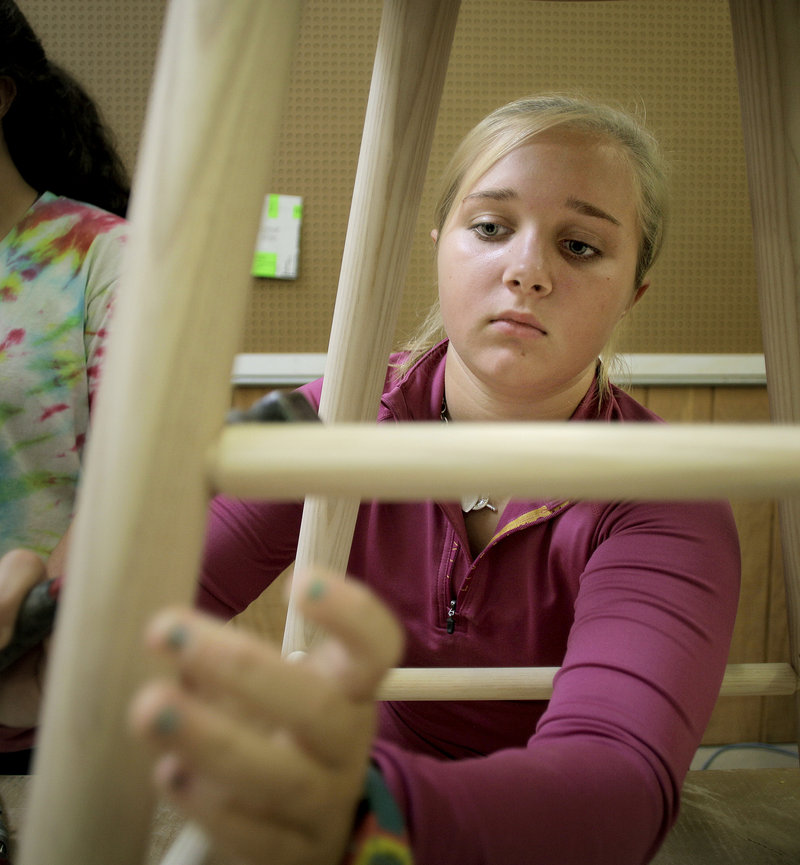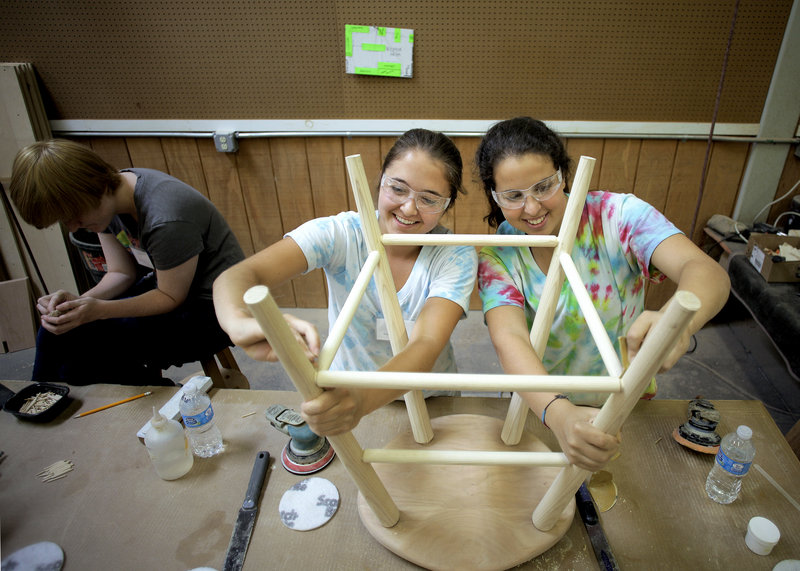AUBURN – Several students at St. Timothy’s School have taken to diving under desks, chairs and other furniture at the girls boarding school in Stevenson, Md., just outside Baltimore.
It’s not for safety. They’re looking for the signatures of the men and women who made the furniture at Thos. Moser Cabinetmaker’s woodshop in Auburn.
Now, the names of a dozen students from St. Timothy’s who spent the past week at the shop are on a table that’s destined for the school’s new common building.
On Thursday, the students completed a version of Thos. Moser’s “customer-in-residence” program, in which buyers of the coveted furniture can spend a week working alongside those who craft it.
Customers-in-residence usually pay as much as $14,000 for the experience. For the students, it was a perk from a recent deal for Thos. Moser to provide furniture for St. Timothy’s new dining hall and commons building.
Last year, a group of students attended as part of a deal in which Thos. Moser furnished an academic building.
Anyonna Hutchinson, who will be a senior at St. Timothy’s, said the experience of building furniture gave her an appreciation for the work that goes into the pieces — and new respect for the school rule against eating or drinking while sitting at the seminar tables.
“We’ll be on the headmaster’s side” with that rule, Hutchinson said.
Each student built a small table to take home, and collaborated on stools and a large table for the school commons area.
Like all Thos. Moser furniture, the pieces received the makers’ signatures. At a signing ceremony Thursday afternoon, the students and Thos. Moser employees signed the pieces.
The head of school, Randy Stevens, said he has been an admirer of Moser’s furniture for years and has made it a practice to stop at the company’s store in Freeport on his way to visit his friend, musician Noel Paul Stookey, in Blue Hill.
When a division of Thos. Moser that makes furniture for companies and large organizations contacted him about furnishing the academic building, Stevens said, he jumped at the chance. Other clients of that division include Harvard University, Sidwell Friends School in Washington and Johns Hopkins Medical Center.
“I’ve always been fascinated by furniture. Furniture tells history,” Stevens said.
Thos. Moser’s Shaker-inspired pieces and focus on craftsmanship “are compatible with the ethos of the school,” he said.
Stevens said he, his wife and other school officials usually take a group of students on an overseas trip in the summer. Last year, the plan was to go to Turkey and Greece. After several parents raised concerns about protests and strikes in those countries at the time, he decided to substitute the Moser experience.
At the time, the switch wasn’t greeted with overwhelming enthusiasm as an alternative to a trip to Europe.
“But they had the most incredible times of their lives,” Stevens said. “It was very easy to get the girls to come this year.”
The girls spent Monday visiting nearby forests that supply some of Moser’s wood, and sawmills where the wood is turned into lumber.
“We walk through the woods, talk about oak and ash and maple, and get them to understand that this furniture is made out of living things around us,” said Aaron Moser, who runs Moser Contract, the part of the company that makes the furniture for corporate and institutional clients.
The students also visited Shaker Village at Sabbathday Lake in New Gloucester. Chelsea Hill of Baltimore was so intrigued by the Shaker culture that she began researching the sect. Her fellow students started calling her “Sister Chelsea.”
The students spent Tuesday, Wednesday and Thursday working alongside the furniture makers, learning about mortise-and-tenon joints, picking up sanding techniques and “using, not playing with, power tools,” said Ali Sugarman, a student from Hot Springs, Ark.
Jim Hagan, who has worked at Thos. Moser for 17 years, said the program tries to strike a balance between recognizing the students’ inexperience and giving them an opportunity to learn a skill. For instance, some pieces are partially cut beforehand but left unfinished so students can learn techniques for making them fit.
Hagan said he passed along a credo that suggests even masters of a craft can always learn a thing or two: “Woodworking is only as good as the mistakes you can fix.”
Thomas Moser, the founder of the company, spent some time with the students, sharing a pizza lunch Thursday and taking part in the signing ceremony. He said the program provides a necessary counterpoint to the technology-rich society in which most teenagers live.
“So many high school kids are totally unaware of the environment they’re in and how it got there,” he said, “like where the chair they’re sitting in came from.”
Edward D. Murphy can be contacted at 791-6465 or at:
emurphy@pressherald.com
Copy the Story Link
Send questions/comments to the editors.






Success. Please wait for the page to reload. If the page does not reload within 5 seconds, please refresh the page.
Enter your email and password to access comments.
Hi, to comment on stories you must . This profile is in addition to your subscription and website login.
Already have a commenting profile? .
Invalid username/password.
Please check your email to confirm and complete your registration.
Only subscribers are eligible to post comments. Please subscribe or login first for digital access. Here’s why.
Use the form below to reset your password. When you've submitted your account email, we will send an email with a reset code.